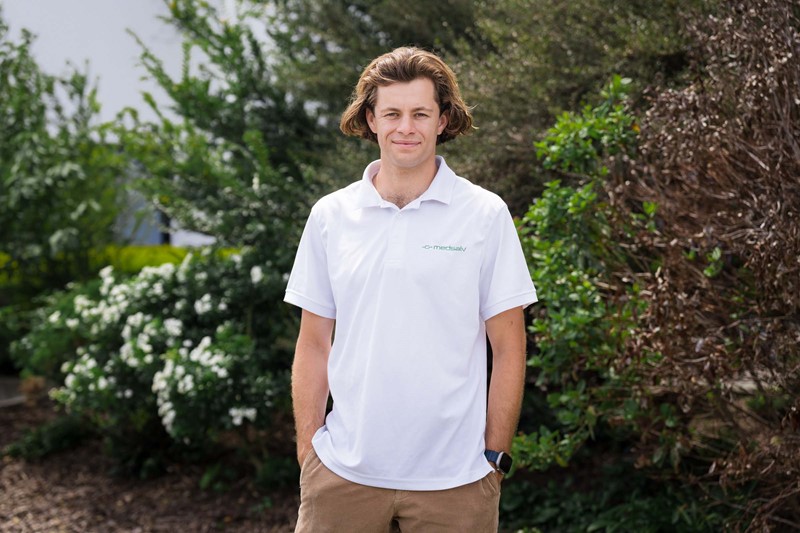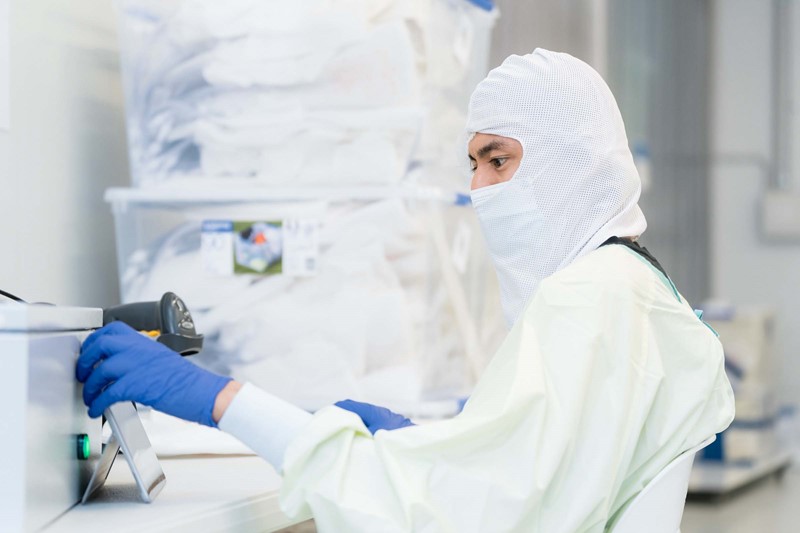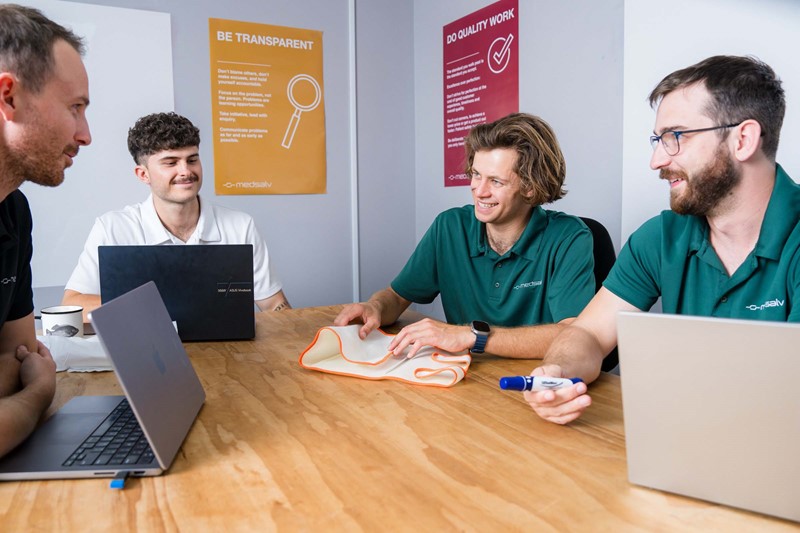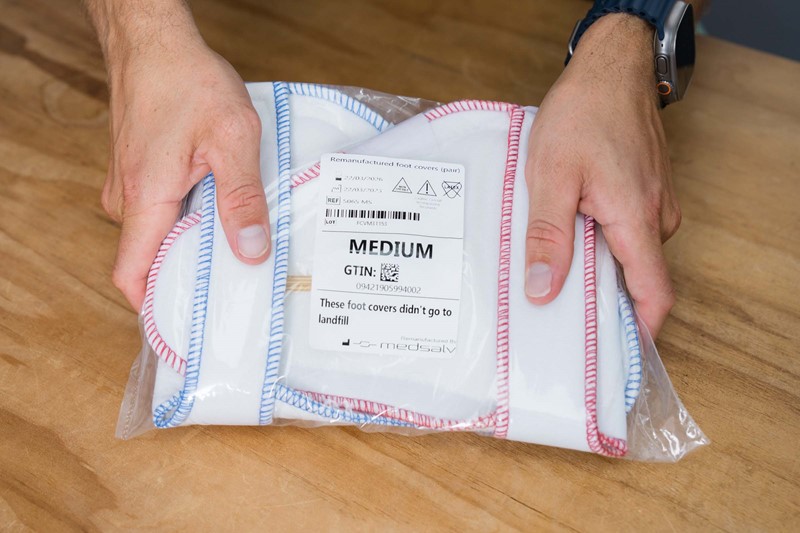Revolutionising Healthcare Through Sustainability And Innovation
Born with a singular purpose – to make healthcare more sustainable – Christchurch-based Medsalv is tackling environmental and financial waste in the industry. Founder Oliver Hunt discovered that many medical products marketed as single-use could actually be reused. He developed a remanufacturing process to clean and test thrombosis prevention sleeves for up to 14 uses. Today, Medsalv has expanded this process to over 50 products.
Born with a singular purpose – to make healthcare more sustainable – Christchurch-based Medsalv is tackling environmental and financial waste in the industry. Founder Oliver Hunt discovered that many medical products marketed as single-use could actually be reused. He developed a remanufacturing process to clean and test thrombosis prevention sleeves for up to 14 uses. Today, Medsalv has expanded this process to over 50 products.

You founded Medsalv in 2017 – what was the main problem you were trying to solve?
Healthcare, while saving lives, produces a huge amount of waste. On top of this, from manufacturing through supply chains to hospitals themselves, it’s responsible for 7% of global emissions. Medsalv is helping the health sector break its commitment to the linear economy and switch to a more sustainable, circular model. We’re changing healthcare for good. The change we’re making – whether in employment, cost savings, waste reduction, or carbon emissions – is real, is measurable, and has wide reaching impact.

The company has made some good inroads locally and expanded into Victoria, Australia. What’s behind that success?
We’ve got something the health system really needs – savings on costs and reductions on emissions. And we’ve got something New Zealand needs – productivity. There’s nothing more wasteful than importing something expensive from overseas, using it, and then throwing it into landfill when you could reuse it, save money, and create employment here in New Zealand. By making that reuse happen, we’re providing those solutions. Those are probably the key drivers behind our success – and we’re capitalising on Australia’s willingness to adopt our proven solutions. By no means are we finished here though – there’s plenty more to be done in Aotearoa.

How do you balance the sustainability aspects of your business with the financial goals necessary for growth and profitability?
Everywhere in the business, these aspects align perfectly. In terms of environmental and social sustainability, that’s easy for us. The amount of waste we reduce from landfill and the number of people we help out is directly correlated to the number of products we sell back to hospitals. So, it’s really hand-in-glove – our financial metrics, our social metrics and our environmental metrics are perfectly linked. If our environmental and social metrics look bad, our financial metrics do too, and vice versa.
I think the key thing with sustainability is that you can't just bolt it on. To make it real, sustainability must be present from the beginning, in the core operating model, and in every decision you make. If you approach it this way, it doesn’t create additional costs. In fact, it creates benefits.
Medsalv’s work not only reduces waste but also offers cost savings for healthcare providers. What kind of feedback have you received from hospitals in New Zealand and Australia about the impact your products have on their budgets and operations?
We’ve had products that were supplied brand new at nearly $200, and now we can supply them for less than $100, delivering a saving of around 50%. In a single Auckland hospital last year, that translated to a saving of $110,000 with just one product. That’s a considerable contribution to our financially stretched health system – and it means money can be spent on things that matter, like providing care to those who need it.
The feedback we’ve received, including a direct quote from someone in the industry, is that we’ve "shaken up" the health system, and that those big companies (who are married to the linear economy) are scrambling, because hospitals in search of much needed change have now realised it’s possible. While desk-driven negotiations can drive some savings, there’s nothing quite like showing up with a product that’s environmentally and socially superior – and significantly cheaper. That’s where the real change happens.
 The opportunity here is clear: by bringing lower cost, equally effective, more sustainable, and locally produced products to the market, there will be direct impact, and there will be ripple effects as other companies are forced to keep up. From my experience, very few suppliers in this industry adopt sustainability just because it’s the ‘right thing to do’; but it becomes a priority when it’s mandatory – or more likely, the prospect of losing revenue is real. It’s high time the health sector played a bit of catch up, and we’re pleased to be leading that.
The opportunity here is clear: by bringing lower cost, equally effective, more sustainable, and locally produced products to the market, there will be direct impact, and there will be ripple effects as other companies are forced to keep up. From my experience, very few suppliers in this industry adopt sustainability just because it’s the ‘right thing to do’; but it becomes a priority when it’s mandatory – or more likely, the prospect of losing revenue is real. It’s high time the health sector played a bit of catch up, and we’re pleased to be leading that.
You’re part of a growing community of entrepreneurs in Christchurch. What do you think makes the city an attractive place for businesses, particularly in the sustainability and innovation space?
One of the biggest advantages is the community's alignment with sustainability. People in Christchurch are already motivated by environmental goals. Whether they’re into mountain biking, surfing, skiing, or hiking in the Southern Alps, it’s easy to find people who care about our planet. Not having to spend time motivating your workforce because they’re already passionate about the cause is massive.
We also have strong academic institutions here, which is another huge asset. Christchurch is home to several great universities, including the University of Canterbury (where I started Medsalv as my Master’s), the University of Otago, and Lincoln University. These institutions are highly active in research, particularly in the biomedical field, with talented medical engineers coming out of the area. Additionally, we have several research institutes based here as well, providing a wealth of expertise and resources.
The city's infrastructure, including micro-labs and testing labs, is more than capable of supporting the types of testing and development needed for innovative products – and the connectedness (being able to ride your bike between meetings for example) makes it easy to get things moving.


